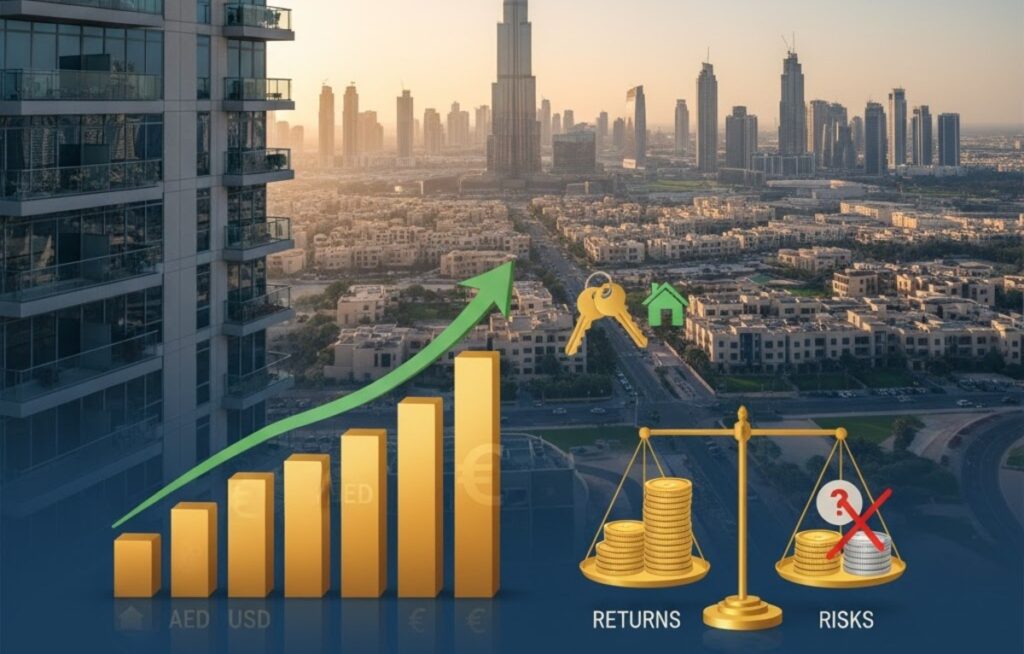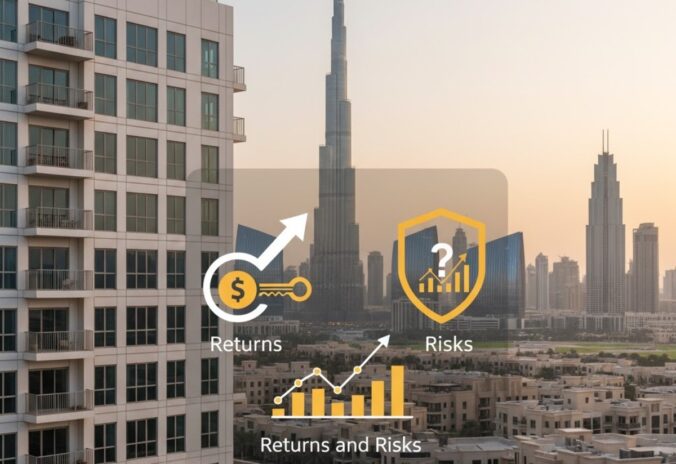Dubai has long been one of the world’s most attractive destinations for real estate investors. With its modern infrastructure, international population, tax-free environment, and strong rental demand, the city offers an ideal environment for those looking to generate consistent rental income. However, while returns can be impressive, understanding the associated risks is essential before making a purchase.
High Rental Yields and Long-Term Growth Potential
One of the main reasons investors are drawn to Dubai’s property market is its exceptionally high rental yields. In many prime districts, such as Dubai Marina, Business Bay, and Jumeirah Village Circle, annual rental returns can range between 6 % and 9 %, significantly higher than what is typically found in mature markets like London or Singapore. According to data from local property platforms, even mid-range apartments in emerging areas such as Al Furjan or Dubai South show steady demand from both residents and expatriates.
This consistent demand is driven by population growth and the influx of professionals relocating to the UAE. Dubai’s visa policies also support investors: property owners who meet certain value thresholds may qualify for long-term residency visas, which further enhances the appeal of buying property. Moreover, the absence of property tax and capital gains tax makes Dubai a rare global destination where gross rental yield often closely matches net yield.
Beyond immediate rental income, there’s also long-term potential for capital appreciation. Infrastructure development, such as new metro lines and waterfront projects, continues to expand the city’s appeal and value of surrounding neighborhoods. For those seeking both passive income and appreciation, Dubai presents a compelling dual opportunity.
Key Risks and How to Manage Them
While the potential gains are attractive, investors must also recognize and manage several risks. Market volatility is one of them: Dubai’s property market has historically experienced cycles of rapid growth followed by corrections. Over-supply in certain areas can temporarily reduce rental prices and occupancy rates. Therefore, location and property type are crucial — investors should prioritize well-connected areas with sustainable tenant demand, such as Dubai Hills Estate or Downtown Dubai.
Another factor to consider is maintenance and management costs. Even though Dubai’s real estate regulations are transparent, managing a property remotely can be challenging. Working with a reliable property management company can help ensure your unit is maintained, tenants are vetted properly, and contracts are renewed on time. This service usually costs around 5–10 % of annual rent but can significantly reduce risks related to vacancies and damage.

Legal and regulatory compliance also plays an important role. Each rental agreement must be registered through Ejari, the government system managed by the Dubai Land Department (DLD). This protects both landlord and tenant and ensures that the rental process adheres to the law. Additionally, buyers should verify the developer’s reputation and the building’s completion status before investing, as off-plan projects involve different types of contractual obligations and payment plans.
Currency fluctuations and financing conditions are further elements to watch. While mortgage rates in the UAE have become more competitive, global interest rate shifts can influence both affordability and investor sentiment. Conducting a thorough financial analysis and seeking professional advice before committing to a purchase is advisable.
A Balanced Approach for Sustainable Returns
Investing in Dubai’s real estate for rental income can deliver excellent financial outcomes if approached with a balanced strategy. Focus on prime or growing areas with long-term rental demand, maintain realistic expectations about yield, and prepare for potential short-term fluctuations. Diversifying across property types — for instance, combining apartments for short-term lets with villas for long-term leases — can also stabilize your income flow.
Ultimately, Dubai remains a resilient and investor-friendly market. Transparent regulations, modern infrastructure, and global connectivity continue to attract tenants and buyers alike. When executed wisely, buying property in Dubai for rental income makes solid economic sense — offering both strong returns and the prestige of owning real estate in one of the world’s most vibrant cities.
For those planning not just to invest but also to settle and enjoy everyday life in the Emirates, understanding what makes living in the UAE so comfortable is equally important. From world-class entertainment and shopping to excellent healthcare and family-friendly communities, the country offers a lifestyle that balances luxury with convenience. To explore how accessible leisure options, modern amenities, and cultural experiences shape daily life, read our in-depth guide — Moving to the UAE: What You Should Know About Accessible Entertainment and Comfortable Living — and discover what awaits beyond the investment opportunities.
